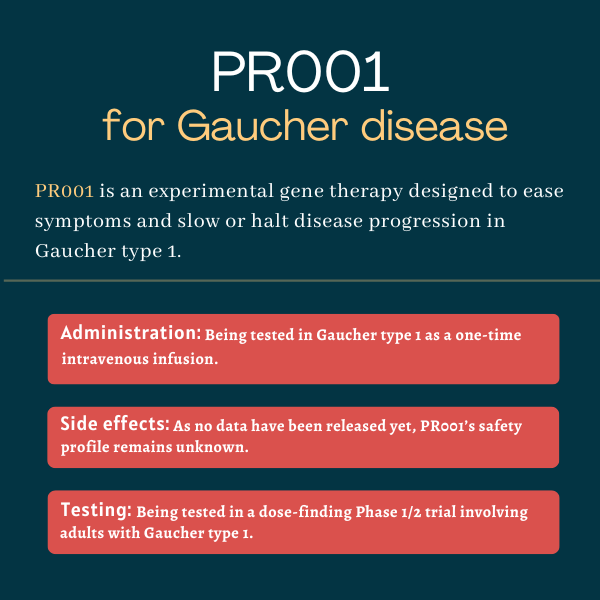
PR001 for Gaucher disease
Last updated April 4, 2025, by Marta Figueiredo, PhD

What is PR001 for Gaucher disease?
PR001 is an experimental gene therapy being developed to ease symptoms and slow or halt disease progression in people with Gaucher disease type 1, the most common form of the disease in Western countries.
Developed by Prevail Therapeutics, a wholly owned subsidiary of Eli Lilly and Company, the therapy is designed to reduce the toxic accumulation of fatty substances that causes Gaucher disease. It is being tested as a single intravenous, or into-the-vein, infusion.
PR001 received orphan drug designation in the U.S. to treat people with Gaucher types 1 and 2. It was also granted rare pediatric disease and fast track designations in the country for the treatment of Gaucher type 2.
The gene therapy is also being tested as a potential treatment for people with Parkinson’s disease who carry mutations that are shared with Gaucher disease.
Therapy snapshot
| Treatment name: | PR001 |
| Administration: | One-time intravenous infusion |
| Clinical testing: | Being tested in Gaucher type 1 patients in a Phase 1/2 clinical trial |
How does PR001 work in Gaucher disease?
All forms of Gaucher disease are caused by mutations in both copies of the GBA1 gene, which contains the instructions for the production of glucocerebrosidase (GCase). This enzyme is responsible for breaking down certain fatty molecules, including glucocerebroside and glucosylsphingosine (lyso-Gb1).
In people with Gaucher, not enough functional glucocerebrosidase is produced, causing these fatty molecules to toxically accumulate in the body and leading to damage and symptoms of Gaucher disease.
Gaucher type 1 — the most common form of the disease in North America and Europe — mainly affects the spleen, liver, and bone marrow, while sparing the brain and spinal cord. Symptoms such as enlarged spleen and liver, as well as low levels of blood clot-promoting platelets, can appear from early childhood to late adulthood.
In contrast, Gaucher types 2 and 3 are marked by an early symptom onset and neurological problems in addition to the abnormalities that are also seen in people with Gaucher type 1.
PR001, also known as LY3884961, is a gene therapy that uses a modified and harmless viral carrier, called an adeno-associated virus serotype 9 (AAV9), to deliver a healthy copy of the GBA1 gene to cells. The gene that is introduced with PR001 has been optimized to increase protein production, but it codes for an enzyme with the same sequence as the naturally occurring GCase enzyme.
By promoting the production of a functional enzyme, the therapy is expected to reduce glucocerebroside and lyso-Gb1 accumulation, easing symptoms and potentially slowing or halting disease progression.
How will PR001 be administered in Gaucher disease?
In an earlier Phase 1/2 trial, PR001 was tested in people with Gaucher type 2 as a one-time injection into a specific region at the base of the brain. This was meant to deliver the GBA1 gene to cells in the brain and spinal cord and ease the neurological symptoms of the disease, but the company is no longer using this administration method or developing the gene therapy for type 2 disease.
An ongoing Phase 1/2 trial is now testing it in people with Gaucher type 1 as a single intravenous infusion that lasts about 90 minutes. No details on the tested doses have been disclosed to date and no results have yet been reported, so it’s still unclear how PR001 will be administered if it ultimately gains approval for Gaucher disease.
PR001 in Gaucher clinical trials
PR001 was initially tested in a Phase 1/2 trial called PROVIDE (NCT04411654) that involved children up to 2 years with Gaucher disease type 2. That study is still ongoing and is following participants for up to five years, being expected to conclude in 2028.
Still, the clinical program for Gaucher type 2 was discontinued in early 2024, and the company shifted its focus to type 1 disease. An international, dose-finding Phase 1/2 trial, dubbed PROCEED (NCT05487599), is now testing PR001 for that indication.
PROCEED
PROCEED is expected to enroll up to 15 adults, 18-65 years, with Gaucher type 1. Eligible patients must be on standard enzyme replacement therapy (ERT) or substrate reduction therapy (SRT) for at least two years, and on a stable dose for at least three months prior to screening.
Participants will receive a single intravenous infusion of PR001 and will be followed for up to five years. Up to three therapy doses will be tested, involving three patients in each dose group. After an optimal dose is established, it will be further assessed in up to six new patients in an expansion group.
The study’s main goal is to evaluate PR001’s safety and tolerability by assessing the frequency and severity of side effects. Secondary goals include changes in spleen volume and in blood levels of platelets, GCase, and lyso-Gb1.
Time from PR001 dosing to discontinuation of ERT or SRT, as well as time to reinitiation of such treatments if necessary, will also be assessed.
PROCEED is expected to end in 2030.
Common side effects of PR001
As no data from PR001 trials in Gaucher disease patients have been reported to date, the therapy’s safety profile in this patient population remains unknown.
Gaucher Disease News is strictly a news and information website about the disease. It does not provide medical advice, diagnosis, or treatment. This content is not intended to be a substitute for professional medical advice, diagnosis, or treatment. Always seek the advice of your physician or other qualified health provider with any questions you may have regarding a medical condition. Never disregard professional medical advice or delay in seeking it because of something you have read on this website.
Recent Posts
- When being ready isn’t the only requirement for pregnancy
- Gaucher disease linked to changes in cell energy and fat processing
- Gene therapy keeps Gaucher patients off standard treatment for up to 2 years
- The things I wish I’d known after my Gaucher disease diagnosis
- New trial data show oral venglustat beats ERT for neurological symptoms




